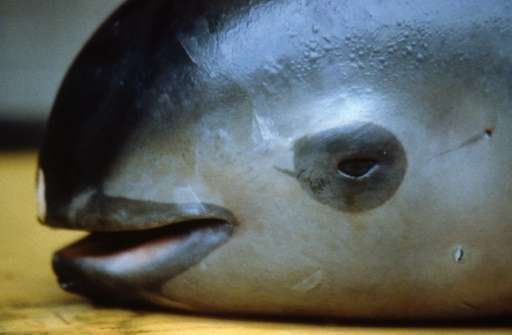The vaquita marina population dropped from 200 in 2012 to fewer than 100 in 2014 and some 60 in late 2015 December
Mexican authorities and scientists are scrambling to save the world's smallest porpoise, the vaquita marina, from extinction, capturing illegal "ghost" fishing nets while hoping to make specimens reproduce in captivity.
The environment ministry said Thursday that the navy, conservation groups and fishermen removed 103 nets between October 10 and December 7 in the upper Gulf of California.
The vaquita's population has dropped under 60 despite the government's deployment of navy ships in April 2015 to prevent illegal fishing with nets that accidentally ensnare the porpoise.
Three drones joined the campaign in July, armed with high-resolution cameras to spot illegal activities in the Gulf area also known as the Sea of Cortez.
The vaquita has died in gillnets used to illegally catch a large fish known as the totoaba, which is also endangered.
Fishermen capture the totoaba for its swim bladder, which is dried and sold to smugglers, who then ship them to China, where it can for tens of thousands of dollars on the black market and is eaten in soup.
Of the 103 nets removed during 21 days, 24 were between 80 and 500 meters long and meant to catch totoaba, shark and other fish.
A local fishing organization, the World Wildlife Fund, the Sea Shepherd Conservation Society and the navy participated in the removal of ghost nets in an area covering 11,814 kilometers (7,340 miles).
"The goal of this ambitious program, which the authorities plan to continue in an uninterrupted manner, is to eliminate abandoned fishing nets and prevent the vaquita marina from being accidentally trapped in them," the environment ministry said.
The porpoise's population dropped from 200 in 2012 to fewer than 100 in 2014 and some 60 in late 2015, according to the International Committee for the Recovery of the Vaquita (CIRVA), a global group of scientists.
At this pace, conservationists fear that the vaquita will be extinct by 2022.
Extinction or salvation
Despite the government's efforts, "the population continues to drop," CIRVA co-chairman Lorenzo Rojas-Bracho told AFP. "We now have less than 60."
In the spring CIRVA and the government, along with the "best veterinarians and biologists in the world," will try to capture the elusive and shy vaquitas.
The hope is to make them reproduce in captivity in the Gulf, "with the utmost care," he said.
"Capturing them is a very difficult decision. It implies risks, but it won't be rushed," Rojas-Bracho said. "In any sign of stress, we will let them be free."
Known as the "panda of the sea" because of the dark rings around its eyes, the 1.5-meter (five-foot) cetacean has rarely been seen alive.
If scientists succeed, it would be the first time that a vaquita is caught alive. Some conservationists have warned against trying to capture it, fearing they could die.
"We don't know what will happen," Rojas-Bracho said. "But we hope that it can be the difference between its extinction and its salvation."
© 2016 AFP























